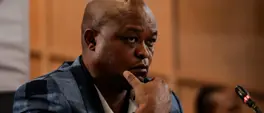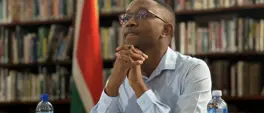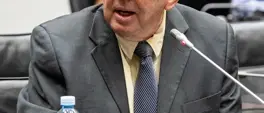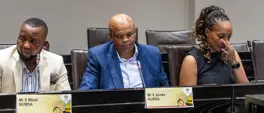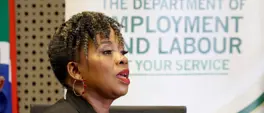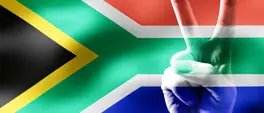MALAIKA MAHLATSI | Ntshavheni’s alarming constitutional delinquency, inhumanity and impunity
Malaika Mahlatsi
17 October 2025 | 12:54"It is far easier to dehumanise and criminalise all foreign nationals than to do the harder, more necessary work of addressing the rot within public service, where government officials are often complicit in criminal syndicates."

Minister in the Presidency, Khumbudzo Ntshavheni, tabling budget for state security in the National Assembly on 15 July 2025. Picture: Phandu Jikelo/Parliament
A week ago, a bus en route to Harare from the Eastern Cape, carrying citizens of Malawi and Zimbabwe, crashed in Makhado in Limpopo Province. Forty-three people, including children, died in the tragedy and forty others were injured.
Limpopo police discovered boxes of antiretroviral (ARV) drugs and other medication at the scene of the fatal crash and have since opened an inquiry. This is because, according to Section 22(a) of the Medicines and Related Substances Act, it is a crime to possess certain scheduled medicines without authorisation.
ARVs, which are used to treat HIV/AIDS by preventing the human immunodeficiency virus from replicating in the body, are Schedule 4 drugs. This category of drugs cannot be acquired over the counter.
While they previously required a doctor’s prescription, specially trained pharmacists can now provide HIV prevention and treatment services through the Pharmacist-Initiated Management of Antiretroviral Therapy (PIMART) initiative.
The programme, which was recently expanded following a Supreme Court of Appeal ruling, allows these pharmacists to provide first-line antiretroviral therapy (ART) for uncomplicated HIV, as well as pre-exposure prophylaxis (PrEP) and post-exposure prophylaxis (PEP), without a doctor’ prescription.
Even so, ARVs are not over-the-counter (OTC) medications, which can be purchased without a prescription and are intended for self-diagnosable, self-treatable conditions, such as analgesics for pain relief, antihistamines for allergies, and decongestants for colds.
For this reason, no one can legally or reasonably be in possession of boxes of ARVs.
Cabinet’s argument that there could be a new syndicate stealing essential medication and transporting it across the border is therefore valid.
However, there are serious concerns about how the South African government, represented by the Minister in the Presidency, Khumbudzo Ntshavheni, has responded to this issue.
Speaking to journalists after a cabinet meeting yesterday, Ntshavheni sought to legitimise the criminality of Operation Dudula, which has been illegally blocking access to public healthcare facilities for undocumented foreign nationals who, by law, have the right to access basic healthcare in public clinics and hospitals.
She stated: “Cabinet calls on foreign nationals to be well-mannered guests in South Africa and reminds everyone that it took a lot of effort to stop the recent unsavoury treatment meted out against foreign nationals at local clinics. Unfortunately, the proof that confirms brazen theft of medicines from government clinics does not assist efforts to restore conditions for foreign nationals to access public healthcare.”
Ntshavheni has consistently demonstrated disregard for the law and seems to take pleasure in being inhumane.
Less than a year ago, she stoodbefore the nation and said, “We will smoke them out,” referring to illegal miners who were refusing to resurface from underground at a mine shaft in Stilfontein in the North-West.
She further stated that the government would not be sending help to the miners, most of whom were foreign nationals, saying: “We are not sending help to criminals. Criminals are not to be helped; criminals are to be persecuted. We didn’t send them there.”
In violation of the Constitution, she is meant to uphold and protect, Ntshavheni disregarded the fact that alleged criminals, like everyone else, have guaranteed human rights under the Bill of Rights. These include the rights to life, dignity, bodily and psychological integrity, food, water, shelter, and equal treatment under the law.
The matter went to court, and the High Court in Pretoria ruled that the community, volunteers, and charitable organisations should be allowed to provide essentials such as food and water to the miners, which the government had sought to block.
While a subsequent urgent application to compel the state to provide humanitarian relief was dismissed with costs, the judge asserted the miners’ right to receive this relief - specifically, food and water, which Ntshavheni had tried to deny them, hoping that starvation would “smoke them out.”
The chilling message behind Ntshavheni’s latest statement is that foreign nationals are responsible for the unjust and unlawful conditions created by Operation Dudula. It implies that the existence of an alleged syndicate stealing medication from public healthcare facilities legitimises the collective punishment Operation Dudula is inflicting on vulnerable immigrants, including children.
One of these children, a one-year-old, died after her Malawian mother, Grace Banda, was turned away from Alexandra Community Health Centre by members of Operation Dudula.
Furthermore, by arguing that foreign nationals should be “well-mannered guests,” Ntshavheni is implying that the protection of their human rights is a privilege based on their behaviour ratherthan a constitutional obligation of the state. Whether foreign nationals are “well-mannered guests” or not, they do not lose their constitutionally enshrined right to basic healthcare.
Those accused of a crime also do not lose their right to equality before the law and equal protection and benefit of the law.
It is particularly curious that Ntshavheni refers to foreign nationals as “guests,” given that African culture traditionally emphasises hospitality, community, and respect for visitors.
Yet foreign nationals in South Africa, both documented and undocumented, are increasingly denied even the most basic level of hospitality and are being isolated from communities. They suffer collective punishment for the actions of a few.
This is why, when one or two foreign nationals smuggle illegally acquired medication to Zimbabwe, the entire immigrantcommunity in South Africa is held accountable.
It is far easier to dehumanise and criminalise all foreign nationals than to do the harder, more necessary work of addressing the rot within public service, where government officials are often complicit in criminal syndicates.
Scapegoating and criminalising foreign nationals has become par for the course in South Africa. This is why a minister in one of the highest offices in the land can consistently demean foreign nationals and disregard their constitutionally enshrined rights with complete impunity.
Those who applaud Ntshavheni’s constitutional delinquency and view her as “radical” must recognise that South Africa is in crisis precisely because those in power enjoy immense impunity. Impunity is the foundation on which systems of corruption and repression are built.
Malaika is a geographer (with expertise in urban geography and water resource governance) and researcher at the Institute for Pan African Thought and Conversation. She is a PhD in Geography candidate at the University of Bayreuth in Germany.
Get the whole picture 💡
Take a look at the topic timeline for all related articles.


